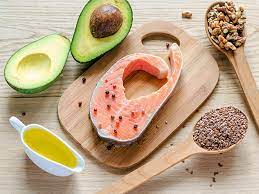The COVID-19 pandemic has caused huge changes and challenges in our lives. People began working from home. Gyms, community sports and parks closed. Stress levels skyrocketed for many, with baking, takeaway food, and drinking becoming major outlets and means of reward. In fact, it’s become somewhat of a running joke: endless memes and jokes about the “quarantine-15” or #quarantineweight.
Don’t get me wrong… gaining a few pounds is completely fine, and something you should never feel ashamed about. However, the stress of the pandemic makes it so important to practice self care for both your physical and mental health. Nobody knows when COVID-19 will end for good. So if this is going to be the new normal, how can we rebuild some of the healthy habits that we adopted pre-covid? A good place to start is fatty acids.
Good vs Bad Fat?

Think all fat is bad for you? For years we’ve believed eating fat will add inches to your waistline, raise cholesterol, and cause numerous health issues. But now we know that not all fat is the same. Fat is an important part of a healthy diet, as it gives you energy, absorbs vitamins and protects your heart and brain health. Therefore, rather than adopting a low-fat diet, it’s more important to focus on eating more “good” fats and limiting the “bad” ones.
Monounsaturated fats and polyunsaturated fats are known as the “good fats” because they are good for your heart, your cholesterol, and your overall health.
Monounsaturated fats include:
- Avocados
- Olives
- Nuts
- Peanut butter
- Olive, canola, peanut, and sesame oils
Polyunsaturated fats include:
- Sunflower, sesame, and pumpkin seeds
- Walnuts
- Fatty fish and fish oil
- Walnuts
- Soymilk
- Tofu
There are two main types of polyunsaturated fats: omega-3 fatty acids and omega-6 fatty acids. Both types offer numerous health benefits.
Benefits of Omega 3, 6 & 9
Omega 3,6 & 9 fatty acids are all important dietary fats.
Omega-3 fatty acids are polyunsaturated fats, a type of fat your body can’t make, therefore you must get it from your diet. Omega-3 fats are a key part of human cell membranes. They also have other important functions, including:
- Improving heart health
- Supporting mental health
- Studies suggest omega-3 may assist in reducing weight and waist size
- Initial research suggests omega-3 may help decrease the amount of fat in the liver
- Supports brain development in a fetus
- May assist in fighting inflammation that occurs with some chronic diseases
Like Omega-3, Omega-6 are polyunsaturated fats that are essential to your health, so need to be obtained in your diet. They mainly provide energy. Some omega-6 fatty acids have shown benefits in treating symptoms of chronic disease (like eczema and psoriasis). Gamma-linolenic acid (GLA) is an omega-6 fatty acid found in certain oils, such as evening primrose oil and borage oil, that may help reduce symptoms of inflammatory conditions. Other studies have also suggested another form of omega-6 - conjugated linoleic acid (CLA) - may help reduce fat mass in humans.
Omega-9 fatty acids are monounsaturated fats that the body naturally produces. It is not strictly an “essential” fat, however, consuming foods rich in omega-9 fatty acids instead of other types of fat may have health benefits. Studies have suggested having more monounsaturated fats in your diet can improve insulin sensitivity and decrease inflammation.
How to get the perfect blend of Omega 3,6 & 9
The health benefits of consuming omega 3,6, & 9 are important throughout our lifespan. In early life, this family of healthy fats play a key role in supporting a child’s healthy brain development in the womb and beyond. During childhood, omega-3 fatty acids support the brain and nervous system’s healthy development and function. As childhood is a period of rapid brain growth and development, it’s important for children to maintain adequate supply of these good fats during this time. This means including more omega-3 in their diet during childhood, may influence a child’s brain development. Increased intake of omega 3,6 & 9 during pregnancy has also been linked to decreased maternal depression, reduced rates of preterm birth and reduced allergies and asthma in children.
Do I need omega 3,6 & 9 fatty acid supplements?
To function properly, your body needs omega 3-6-9 fatty acids. Your body can’t produce omega-3 and omega-6 essential fatty acids, so you must get them from food or supplements. Omega 3,6,9 fatty acid intake in the Western diet is typically low compared to recommended intakes. Supplements deliver the health benefits provided by the individual fatty acids, and provide a balanced amount of all three acids. The trick is to consume these fatty acids in the right ratio. Omega 3,6 & 9 are all important dietary fats that have numerous health benefits, but it’s important to get the right balance between them. An imbalance in your diet may contribute to a number of chronic diseases.
Mega Oil

While many of the Grahams Natural treatments are topical, our Mega Oil works to nourish your body from the inside out. Containing 100% natural oil ingredients including Omega 3, 6 and 9, our oil works to treat gut issues that can contribute to skin disorders and overall health issues. Mega Oil contains the perfect ratio of 2:1:1 of Omega 3, 6,9.
Mega Oil contains the following ingredients: Flaxseed Oil, Evening Primrose Oil, Borage Oil, Safflower Seed Oil, Sunflower Seed Oil, Sesame Seed Oil, Pumpkin Seed Oil. These oils combined hold a large amount of health benefits to your body and skin.
The Grahams Natural Mega Oil has been developed to be an easy additive to any skin sufferers or healthy living activists’ lifestyle. It comes in a liquid form instead of a capsule, as liquid supplements are much more readily broken down and absorbed into the body. This is because it does not have a hard outer shell that has to disintegrate for absorption. Additionally, studies have shown liquids are more completely and quickly absorbed than most capsules and pills.
Another benefit of Mega Oil being in a liquid form, is that it can be easily added to a variety of foods and drinks. This includes pasta, rice, oats, vegetables, yoghurt or fruit. Also, the supplement does not contain any fish and has a neutral, nutty taste - making it easy to consume all the incredible health benefits that oil has to offer.
Check out our Mega Oil Ebook for recipes and information.





